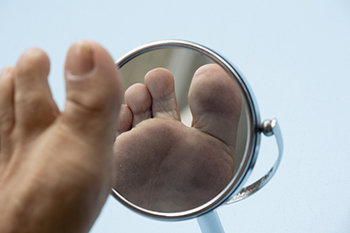Millions of people in America suffer from diabetes, which often leads to complications in their feet. Diabetes impairs the body’s ability to regulate blood glucose levels. This, in turn, disrupts the functionality of white blood cells which are critical in closing wounds. Additionally, diabetes can lead to poor circulation, and this reduces the amount of nutrients sent to wound sites and further impairs the healing process. Neuropathy, or nerve damage, is another condition associated with diabetes. Neuropathy further complicates diabetic wound management because it can prevent diabetic adults from feeling when there is trauma or an injury to their skin, and wounds may progress before they are even discovered. All of these factors combined make the diabetic wound harder to detect and heal, which may lead to infection and worse—if it's not treated properly. If you are diabetic, it's important to be under the care of a podiatrist who can offer preventative measures against foot wounds and treat them promptly and properly if they do develop.
Wound care is an important part in dealing with diabetes. If you have diabetes and a foot wound or would like more information about wound care for diabetics, consult with one of our podiatrists from Palmetto Podiatry Group of Anderson. Our doctors will assess your condition and provide you with quality foot and ankle treatment.
What Is Wound Care?
Wound care is the practice of taking proper care of a wound. This can range from the smallest to the largest of wounds. While everyone can benefit from proper wound care, it is much more important for diabetics. Diabetics often suffer from poor blood circulation which causes wounds to heal much slower than they would in a non-diabetic.
What Is the Importance of Wound Care?
While it may not seem apparent with small ulcers on the foot, for diabetics, any size ulcer can become infected. Diabetics often also suffer from neuropathy, or nerve loss. This means they might not even feel when they have an ulcer on their foot. If the wound becomes severely infected, amputation may be necessary. Therefore, it is of the upmost importance to properly care for any and all foot wounds.
How to Care for Wounds
The best way to care for foot wounds is to prevent them. For diabetics, this means daily inspections of the feet for any signs of abnormalities or ulcers. It is also recommended to see a podiatrist several times a year for a foot inspection. If you do have an ulcer, run the wound under water to clear dirt from the wound; then apply antibiotic ointment to the wound and cover with a bandage. Bandages should be changed daily and keeping pressure off the wound is smart. It is advised to see a podiatrist, who can keep an eye on it.
If you have any questions, please feel free to contact our office located in Anderson, SC . We offer the newest diagnostic and treatment technologies for all your foot care needs.

